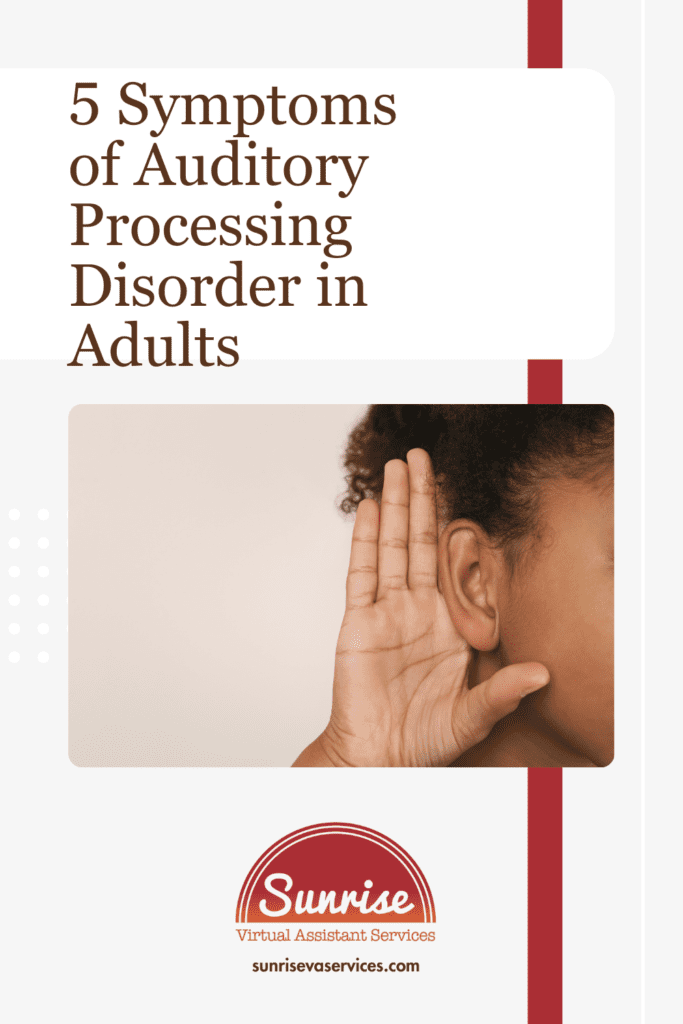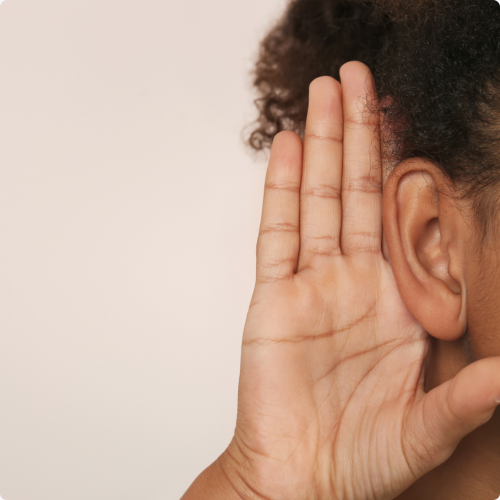The symptoms of Auditory Processing Disorder (APD) aren’t just for kids—it can sneak up on adults, too. Imagine trying to follow a side-bar conversation in a noisy café and feeling like you’re deciphering ancient scripts. That’s how APD can feel.
If you’re nodding along, thinking, “Yep, that’s me,” then pull up a chair (or, you know, stay in your cozy spot) and let’s chat about the five telltale symptoms of APD in adults.
The Impact of APD
APD, also more commonly known as Central Auditory Processing Disorder, is a condition affecting how your wonderful brain processes auditory information.
People with APD have normal hearing but often experience communication difficulties. APD is also common with those who have ADHD (you know, attention deficit hyperactivity disorder) and ASD (autism spectrum disorder).
While it’s often thought of as only affecting school-aged children, adults can also be affected, leading to challenges in various settings. From struggling with background noise to needing a speech-language pathologist more than your morning coffee, the symptoms of auditory processing disorder can impact daily life in surprising ways.
Top Five Most Common Symptoms of Auditory Processing Disorder
Difficulty in Noisy Environments
One of the classic hallmark symptoms of auditory processing disorder that gives most of us a hard time is having difficulty following conversations in noisy environments.
Picture this: you’re standing in a busy coffee shop talking on the phone, and your friend tells you the juiciest gossip of the year. But instead of soaking in the drama, all you hear is a chaotic rackett of the customers ordering drinks and the new guy having a meltdown behind the counter when he spills someone’s latte.
This struggle is known as auditory figure-ground discrimination—the difficulty of distinguishing speech from background noise.
For adults with APD, noisy environments can feel like trying to watch a movie in a crowded theater with people talking loudly around you. It’s not just an inconvenience—it can affect professional settings, social interactions, and even one’s sense of self-confidence.
Trouble Distinguishing Sounds
Words are funny; sometimes they sound similar, but are totally different! If you’ve ever confused “bear” with “bare” or “pail” with “pale,” you might be experiencing another common symptom of APD.
This is all about having a tough time telling similar sounds or words apart, which is what we call auditory discrimination. It can feel like your brain is in a bit of a struggle, trying to pick up on those little differences in sounds, making chatting and understanding feel like one big guessing game.
This symptom can make language skills and communication, in general, a bit like a game of telephone—only not as fun. For those with APD, every conversation can feel like a watching a YouTube video on 14x speed, making it harder to keep up. And, of course, missing out of a lot of information.
Frequent Need for Repetition
Ever feel like you’re asking “What?” more often than a toddler who just discovered the word? That’s another fun sign of APD.
Adults with auditory processing issues often need repetition or clarification in communication. It’s not a hearing issue, per se, but more like your brain’s email server went down, and you’re stuck in a loop of asking for the message again.
This need for repetition can become particularly apparent in noisy settings or when receiving verbal instructions. Naturally, no one wants to repeat themselves ad nausem. But the frustration of constantly asking for a repeat can affect relationships and professional communication, potentially leading to misunderstandings. It can be a true catch-22.
Challenges with Language Skills
Keeping up with the latest trends in popular slang is hard enough! But most adults with APD might find reading, spelling, and understanding spoken language more challenging than assembling a piece of flat-pack furniture sans instructions.
Think of your brain as the processor in your 35 year old computer or laptop. The processing of auditory information in the brain can feel like a sluggish download, impacting someone’s ability to efficiently decode speech sounds and verbal instructions. It’s as if Data from Star Trek were built in 1988, expecting to run on 2024 technology.
While this can mimic symptoms of learning disabilities or neurological disorders, APD primarily affects your auditory processing skills. Tasks that involve verbal information can seem daunting, adding extra layers of effort to everyday activities like following a meeting or reading a book.
Sensitivity to Loud Sounds
Finally, if you’ve ever felt like covering your ears at the sound of a fire engine racing by or a plate shattering at a restaurant, you may be experiencing sensitivity to loud sounds or environments.
Adults with APD often have heightened sensitivity to sound waves, finding certain noises excessively jarring or uncomfortable.
This sensitivity can affect one’s ability to work in certain environments, attend events, or even enjoy a night out. The central auditory system might perceive sounds as more intense, prompting reactions that can seem exaggerated to those around you.
Conclusion
Understanding and recognizing the symptoms of auditory processing disorder in adults can lead to better management strategies and improved quality of life.
Whether it’s working with a speech-language pathologist, employing assistive technology, or developing compensatory strategies, there are ways to manage these symptoms and enhance communication skills.
If you suspect you might have APD, it’s worth consulting with healthcare providers who specialize in auditory processing challenges. With the right support, you can tune into the world around you with greater clarity and confidence.
Until then, keep your sense of humor at the ready—you’ll need it in this sound-filled adventure called life.


